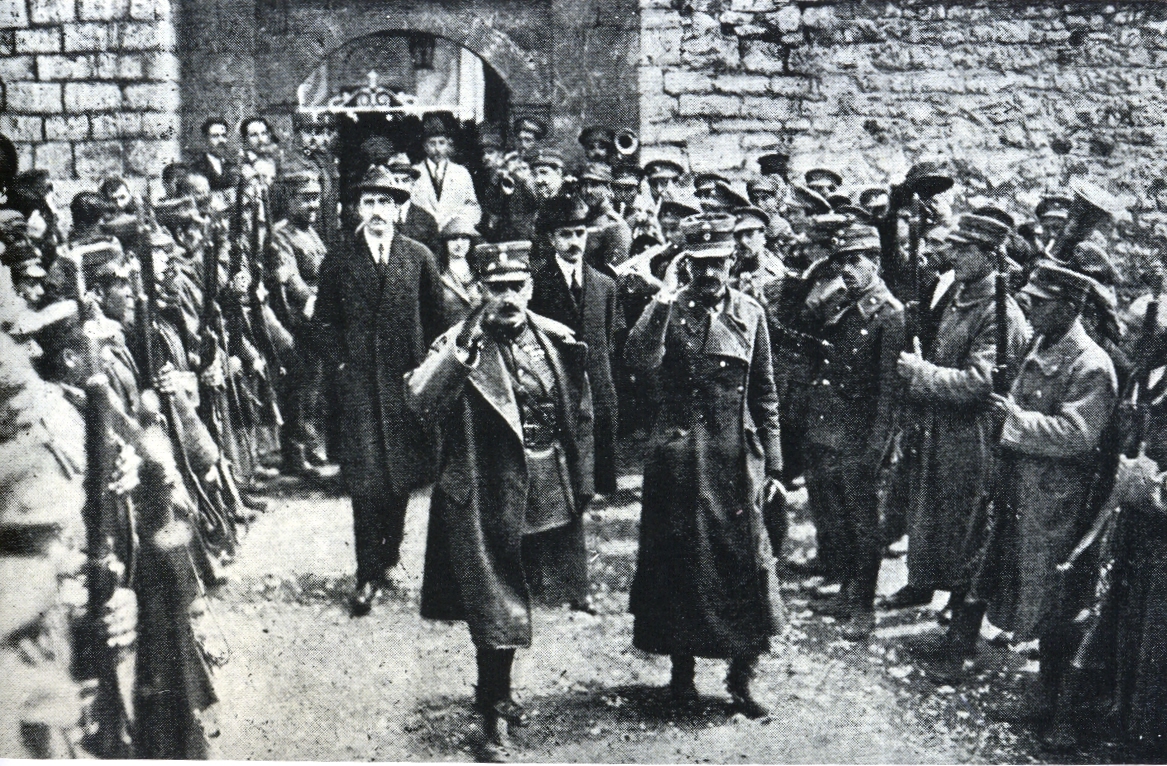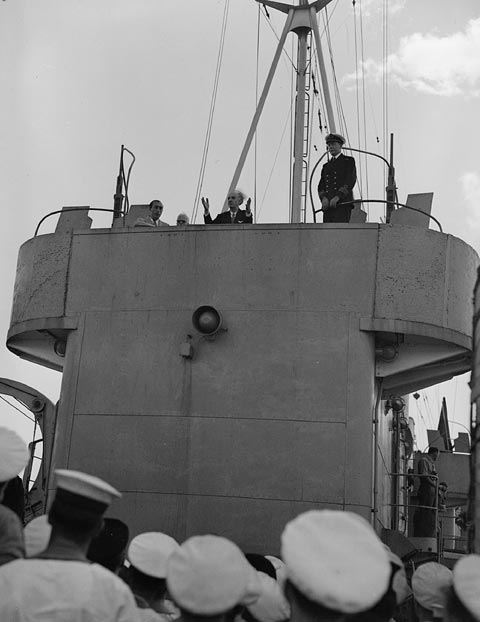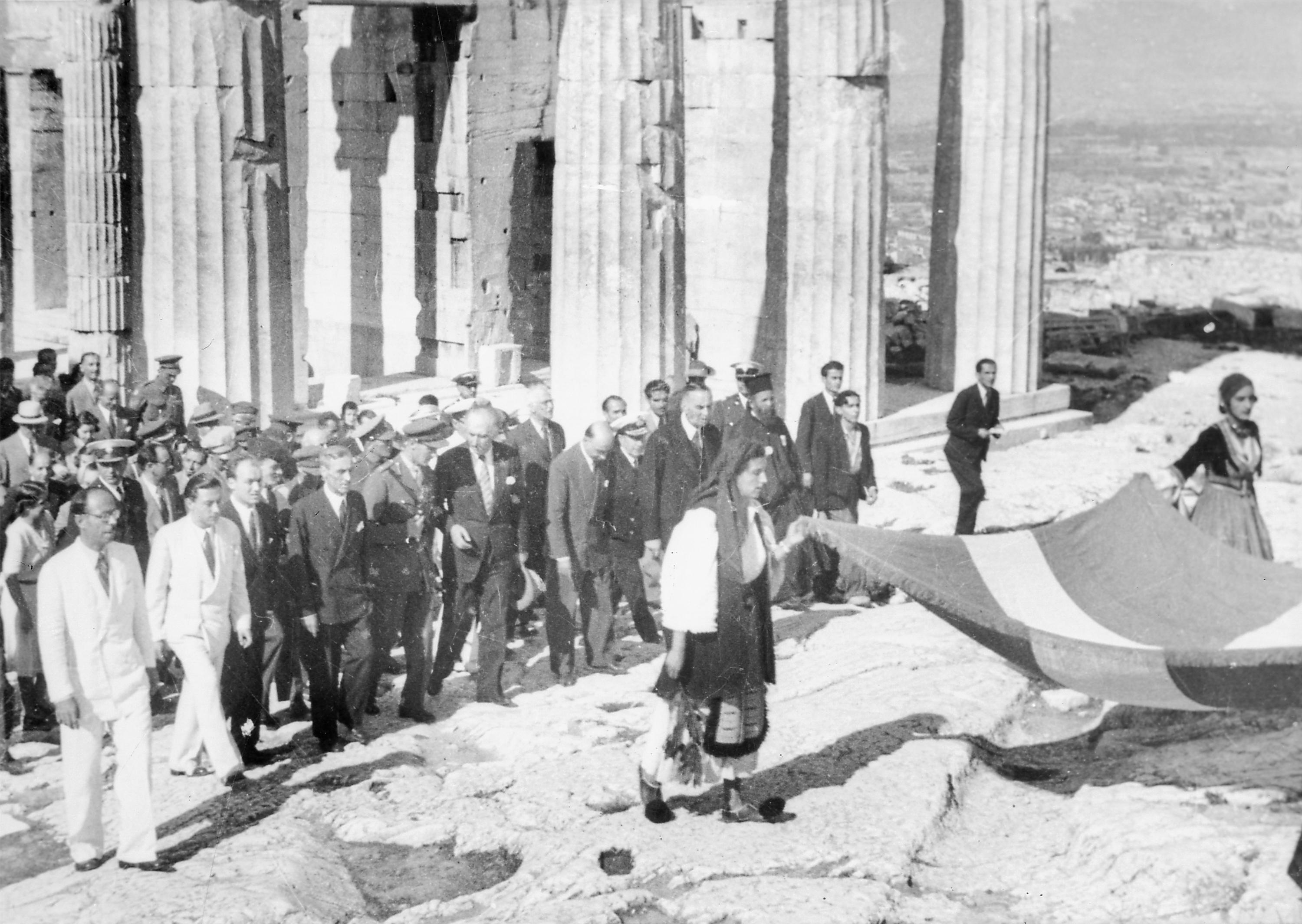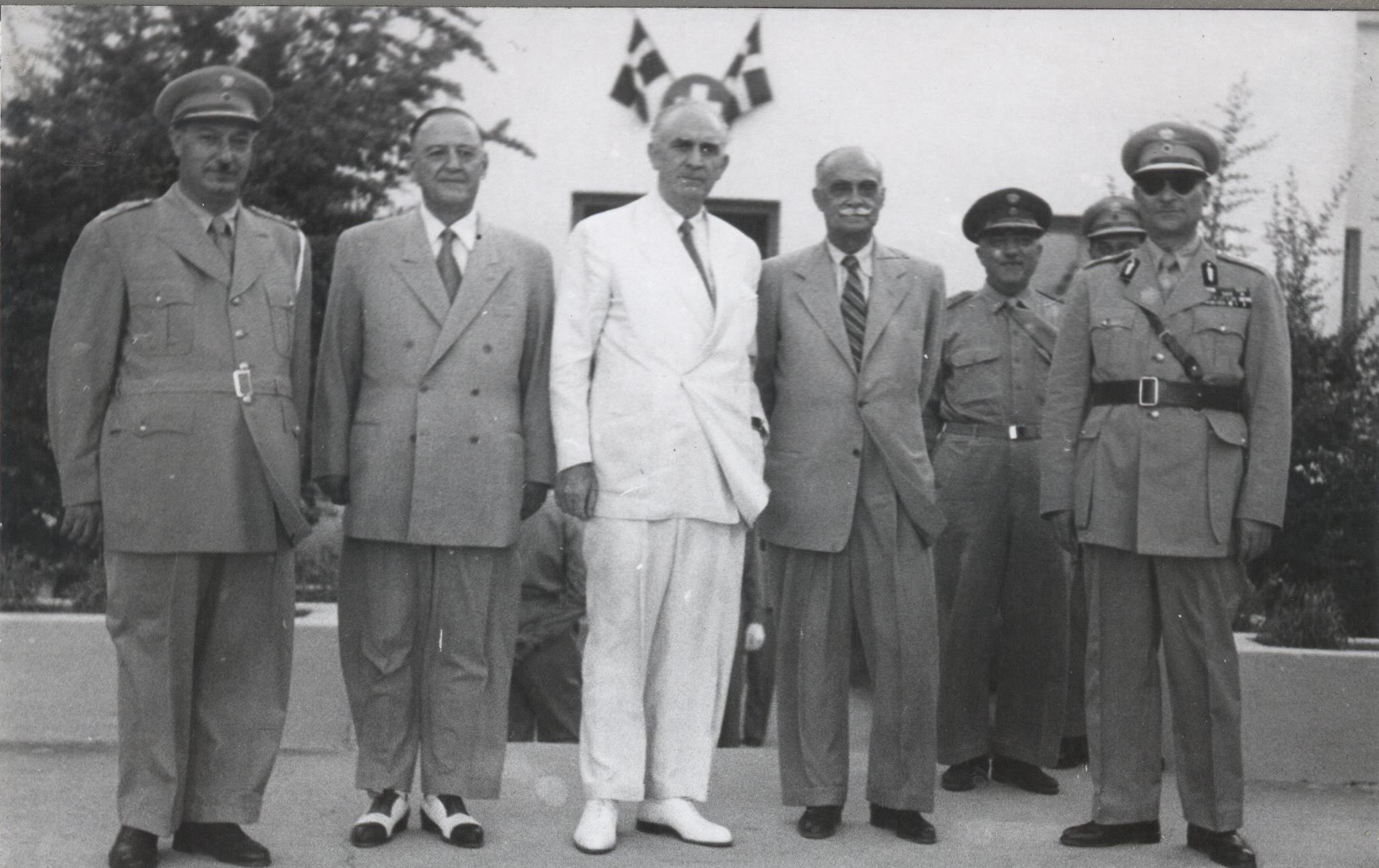1. Early Life and Background
Georgios Papandreou's personal background laid the foundation for his extensive political career, marked by early social activities and strong influences from European political thought.
1.1. Birth and Family
Georgios Papandreou was born on February 13, 1888, in Kalentzi, located in the Achaea region of the northern Peloponnese. His father was Andreas Stavropoulos, an Orthodox archpriest (protopresvyteros). His surname, Papandreou, is derived from his father's Christian name and the Greek word papas, meaning "priest."
He was married twice. His first wife was Sofia Mineyko, a Polish national, whose father was Zygmunt Mineyko. Their son, Andreas Papandreou, who would later become Prime Minister of Greece, was born in Chios in 1919. His second wife was the acclaimed actress Cybele Andrianou, and their son was named George Papandreou. The birth of Andreas and George marked the beginning of the influential Papandreou political dynasty in Greece.
1.2. Education and Early Influences
Papandreou pursued his higher education by studying law in Athens and later political science in Berlin, Germany. His time in Berlin, particularly, exposed him to and heavily influenced his political philosophy with the principles of German social democracy. This exposure instilled in him a strong opposition to the monarchy and a commitment to advocating for generous social policies throughout his career.
As a young man, he became involved in politics as a devoted supporter of the Liberal leader Eleftherios Venizelos. This early political involvement led to his appointment as governor of Chios by Venizelos following the Balkan Wars in 1912.
2. Political Career
Georgios Papandreou's political career was extensive, spanning over five decades and marked by significant events, ministerial roles, and multiple terms as Prime Minister.

2.1. Early Political Activities and Ministerial Roles
During the political crisis surrounding Greece's entry into the First World War, Papandreou emerged as one of Eleftherios Venizelos's closest and most fervent supporters against the pro-German monarch, King Konstantínos I. When Venizelos was compelled to leave Athens in 1916, Papandreou accompanied him to Crete before proceeding to Lesbos. On Lesbos, he actively mobilized anti-monarchist supporters across the islands and rallied support for Venizelos's insurgent pro-Allied government established in Thessaloniki. In 1921, as a lawyer, he notably defended Alexandros Papanastasiou during a trial stemming from Papanastasiou's public criticism of King Konstantínos. Due to an article he published calling for King Konstantínos's abdication, Papandreou was imprisoned by the royalist regime and later narrowly escaped an assassination attempt by royalist extremists on Lesbos.
In the 1920 general election, Papandreou unsuccessfully ran as an independent liberal in the Lesbos constituency. However, from January to October 1923, he served as interior minister in the cabinet of Stylianos Gonatas. Following the December 1923 elections, he was elected as a Venizelist Liberal Party member of parliament for Lesbos. His subsequent ministerial roles included serving as finance minister for a brief period in June 1925, education minister from 1930 to 1932, and transport minister in 1933. As Minister of Education, he initiated significant reforms within the Greek school system and oversaw the construction of numerous schools, particularly to accommodate the children of refugees from the Greco-Turkish War (1919-22).
2.2. Opposition to Monarchy and Dictatorships
Georgios Papandreou was a lifelong and unwavering opponent of the Greek monarchy. His steadfast anti-monarchist stance frequently brought him into direct conflict with authoritarian regimes of his time. During the dictatorship imposed by General Theodoros Pangalos, Papandreou was subjected to imprisonment. Later, in 1935, following a royalist coup led by Georgios Kondylis aimed at restoring the monarchy, Papandreou was placed in internal exile. His opposition continued, and in 1938, under the rule of the royalist dictator Ioannis Metaxas, he was once again exiled. These repeated imprisonments and exiles underscored his consistent dedication to democratic principles and his resistance against monarchical and dictatorial rule in Greece.
2.3. World War II and Government-in-Exile
Following the Axis occupation of Greece during the Second World War, Georgios Papandreou was initially imprisoned by the Italian authorities. Upon his release, he managed to flee to the Middle East, where he joined the predominantly Venizelist Greek government-in-exile based in the Kingdom of Egypt. With crucial British support, King Geórgios II appointed him as Prime Minister of the government-in-exile.
Under his premiership, two pivotal conferences took place aimed at resolving the escalating political crisis within Greece and mitigating conflicts between the EAM (National Liberation Front) and non-EAM forces, which were precursors to the Greek Civil War. These were the Lebanon conference in May 1944 and the Caserta Agreement in September 1944. These agreements sought to establish a national unity government and prevent civil strife upon Greece's liberation.

2.4. Premiership during Liberation and Dekemvriana
After the Axis powers withdrew from Greece, Georgios Papandreou returned to Athens in October 1944 as Prime Minister of the Greek government-in-exile, accompanied by units of the Greek Army and the Allied forces. In the same month, he formally assumed the premiership of the Greek government of National Unity, which succeeded the government-in-exile.
Upon his return, Papandreou faced the daunting challenge of normalizing the highly polarized political situation between the EAM and non-EAM forces. He actively collaborated with Lieutenant-General Sir Ronald Scobie, who, under the terms of the Caserta Agreement, was responsible for all Allied forces in Greece. Despite his efforts to foster national unity, the political tensions culminated in the Dekemvriana events, a series of clashes in Athens in December 1944. Papandreou ultimately resigned from his position in 1945 following these tumultuous events.

2.5. Post-Civil War Ministerial Roles
Even after his resignation in 1945 following the Dekemvriana events, Georgios Papandreou continued to hold significant public office during the turbulent post-Greek Civil War period. From 1946 to 1952, he served in a variety of cabinet positions, demonstrating his enduring influence and commitment to public service. His roles during this period included labour minister, supplies minister, education minister, finance minister, and public order minister. Additionally, from 1950 to 1952, he served as Deputy Prime Minister in the governments led by Nikolaos Plastiras and Sofoklis Venizelos.
The period between 1952 and 1961 proved particularly challenging for Papandreou and the liberal political forces in the Kingdom of Greece. Weakened by internal disputes, these forces suffered significant electoral defeats at the hands of the conservatives. Papandreou consistently attributed these setbacks to the leadership of Sofoklis Venizelos, whom he found uninspiring and ineffective.

2.6. Founding the Centre Union and Later Premierships
In 1961, Georgios Papandreou played a pivotal role in revitalizing Greek liberalism by founding the Centre Union Party. This new political entity was a broad confederation that brought together traditional liberal Venizelists, social democrats, and dissatisfied conservatives. Following the elections of 1961, which Papandreou famously denounced as marred by "violence and fraud," he declared a "Relentless Struggle" against the right-wing ERE and the "parakrátos" (often translated as "deep state") of the right.
His persistent efforts bore fruit, as his party secured victories in the elections of November 1963 and, more decisively, achieved a landslide majority in the 1964 elections. These triumphs brought him back to the premiership, where he began implementing his progressive policies.
2.7. Confrontation with the Palace and Fall from Power
Upon Georgios Papandreou's return to the premiership, his progressive policies met with considerable opposition from conservative circles within Greece. Adding to the tension was the increasingly prominent role of his son, Andreas Papandreou, whose political stances were perceived as significantly further to the left than his father's. Andreas actively developed a network of political organizations known as the "Democratic Leagues" (Dimokratikoi Syndesmoi) to advocate for more progressive policies and also gained control of the Centre Union's youth organization, further solidifying his influence.
Papandreou had also voiced opposition to the Zürich and London Agreement, which eventually led to the establishment of the Republic of Cyprus. Following intense clashes between the Greek and Turkish communities on the island, his government dispatched a Greek army division to Cyprus to help stabilize the situation.
The political climate was further destabilized by the open opposition of King Constantine II to Papandreou's government. Frequent ultra-rightist plots within the Army also contributed to the government's instability. Ultimately, the King orchestrated a split within the Centre Union. In July 1965, a major political crisis erupted, known as the Apostasia (or "defection"), also referred to as the Iouliana (July events) or the "King's coup." This crisis culminated in Papandreou's dismissal from the premiership following a dispute over control of the Ministry of Defence.
2.8. Arrest and Death under Military Junta
Following the military coup on April 21, 1967, orchestrated by the Colonels' junta led by George Papadopoulos, Georgios Papandreou was arrested. He remained under house arrest until his death on November 1, 1968.
His funeral, held amidst the oppressive military regime, transformed into a massive and spontaneous anti-dictatorship demonstration, reflecting the deep public discontent with the junta and Papandreou's enduring popularity and symbolic status as a champion of democracy. He was interred at the First Cemetery of Athens, alongside his son Andreas.
3. Philosophy and Ideology
Georgios Papandreou's political thought was characterized by a distinct blend of progressive and democratic principles, shaped by both intellectual influences and a deep commitment to social welfare.
3.1. Core Ideological Principles
At the heart of Georgios Papandreou's ideology was the strong influence of German social democracy, which he encountered during his studies in Berlin. This intellectual foundation led him to be an adamant opponent of the monarchy throughout his political career, viewing it as an obstacle to true democratic governance. Consistently, he supported generous social policies aimed at improving the living conditions and welfare of the Greek populace. His dedication to these principles was unwavering, defining his approach to governance and reform.
3.2. Views on Communism and Democracy
Georgios Papandreou held a firm anti-communist stance, particularly against the policies and influence of the Communist Party of Greece (KKE) within Greece. He viewed communism as a significant threat to democratic principles and actively worked to counter its influence, especially during the tumultuous period of the Greek Civil War in the late 1940s. Despite his strong opposition to communism, his commitment to fighting for democratic principles remained paramount throughout his life. He was widely regarded as a persistent fighter for democracy, consistently advocating for a multi-party system and the fundamental freedoms associated with a democratic society.
4. Major Policies and Social Reforms
During his tenure as a minister and later as prime minister, Georgios Papandreou implemented key policy initiatives focused on societal improvement, particularly in education and welfare.
4.1. Educational Reforms
As Minister of Education from 1930 to 1932, Georgios Papandreou undertook significant efforts to reform the Greek school system. Recognizing the need to modernize and expand access to education, he implemented changes aimed at improving the quality and accessibility of schooling across the country. A notable achievement during this period was his initiative to build many new schools specifically for the children of refugees from the Greco-Turkish War (1919-22), demonstrating his commitment to social welfare and integration through education.
4.2. Welfare and Economic Improvements
During his premiership from 1963 to 1965, Georgios Papandreou spearheaded a range of progressive social and economic reforms. These initiatives were designed to improve the welfare of the Greek population and enhance economic equity. Significant improvements were made in the health and welfare sectors, indicating a focus on social security and public well-being.
Furthermore, general government transfers directed towards education services experienced a substantial increase, rising by over 55%. This investment was paralleled by notable increases in the enrollment of pupils in both secondary and higher education institutions, signaling a commitment to expanding educational opportunities across all levels. Economically, consumption per capita saw a rise from 14.00 K GRD to 17.00 K GRD, reflecting a general improvement in living standards. Importantly, income distribution also improved as a direct result of his party's income policy, which was strategically geared towards increasing wage and agricultural income, thereby benefiting a broader segment of the population.
5. Legacy and Reception
Georgios Papandreou's life and achievements have left an indelible mark on Greek politics, shaping its trajectory for generations.
5.1. Positive Reception
Georgios Papandreou is widely regarded as one of the finest orators in the history of Greek politics and is remembered as a persistent fighter for democracy. His contributions to the restoration and strengthening of democratic institutions in Greece are highly praised. During the military junta and after his death, he was affectionately referred to as "ο Γέρος της Δημοκρατίας" (o Géros tis Dimokratías), meaning "the old man of Democracy," a testament to his unwavering commitment to democratic principles and his profound influence on the Greek people. His progressive social reforms, particularly in education and welfare during his premiership, are often cited as major achievements that positively impacted Greek society.
5.2. Criticism and Controversies
Despite his positive legacy, Georgios Papandreou's career also faced criticism and controversy. One notable period of scrutiny revolves around his handling of the highly polarized political situation during the Dekemvriana events in 1944. Although he made efforts to normalize relations between the EAM and non-EAM forces, the ensuing clashes led to his resignation and highlighted the deep divisions within Greek society at the time.
Another significant controversy was the "Apostasia" (defection) or "Iouliana" (July events) crisis. This political upheaval, which led to his dismissal from the premiership by King Constantine II over a dispute regarding control of the Ministry of Defense, is often seen as a period of intense instability and a precursor to the 1967 military coup. Critics suggest that his confrontational stance with the monarchy contributed to the political deadlock.
5.3. Influence and Political Dynasty
Georgios Papandreou's specific influence on Greek politics is profound, primarily due to his role as the founder of the Papandreou political dynasty. His son, Andreas Papandreou, and his grandson, George A. Papandreou, both followed in his footsteps to become Prime Ministers of Greece, solidifying the family's enduring impact on the nation's political landscape. This lineage represents a unique continuity of political leadership in Greece.
To distinguish him from his grandson, a common practice among most Greek writers is to use the full name Γεώργιος (Geórgios) when referring to the grandfather, and the less formal Γιώργος (Giórgos) when referring to his grandson.
6. Works
- The Liberation of Greece, Athens, 1945
7. Tributes and Memorials
In recognition of his significant contributions, the University of Belgrade awarded Georgios Papandreou an honorary doctorate in 1965.